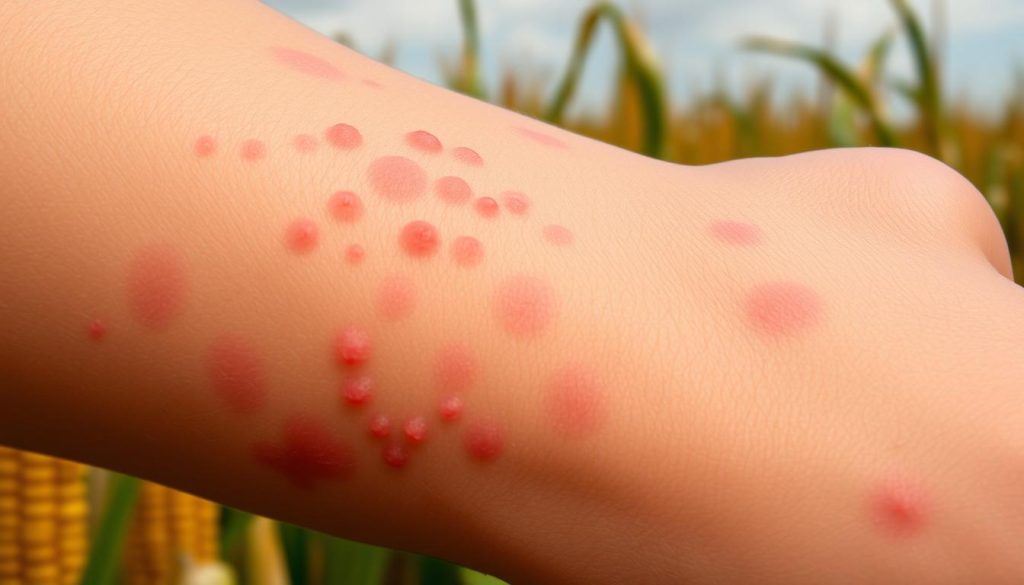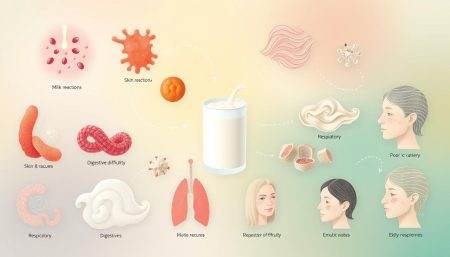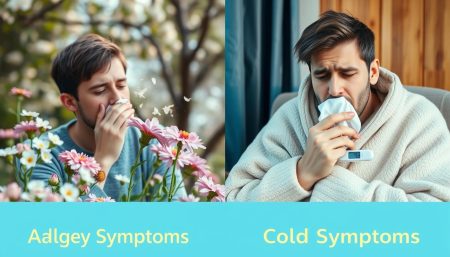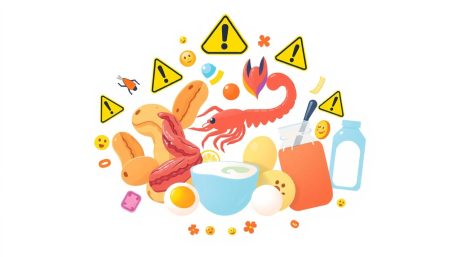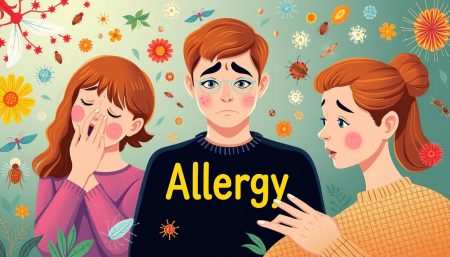Food allergies are becoming more common, and knowing how to spot corn allergy symptoms is crucial. Corn is a common food that can cause problems for some people. It can lead to discomfort and health issues.
For those who find it hard to figure out if corn is the problem, this guide is here to help. It sheds light on the signs of corn allergy. Symptoms can range from breathing problems to stomach issues. This guide aims to help you understand these challenges and find ways to manage corn allergies.
Key Takeaways
- The importance of recognizing a broad spectrum of corn allergy symptoms
- Strategies for managing corn allergies and minimizing exposure
- Tips for identifying hidden sources of corn in the diet and environment
- Understanding the difference between allergy and intolerance to corn
- Guidance on seeking professional diagnosis and treatment for corn allergies
- Educational insights to empower health-conscious individuals and families affected by corn allergies
Understanding Corn Allergies: Basics and Prevalence
Exploring food allergies, understanding corn allergies is key. Corn is everywhere in food, making allergies to it complex. An allergic reaction to corn can range from mild skin issues to serious breathing problems.
The prevalence of corn allergy varies by group, showing patterns for doctors and patients. Studies show corn allergy is less known than others but still important. It needs more attention.
| Age Group | Reported Cases | Severity |
|---|---|---|
| Children (0-10 years) | Higher incidence | Mild to moderate |
| Adults (18+ years) | Lower incidence | Moderate to severe |
This summary shows why understanding corn allergies is vital. It helps in making better diets and safer places. Quick action can greatly improve life for those with allergies. This highlights the need for more awareness and action.
Identifying Corn Allergy Symptoms
It’s important to know the signs of corn allergies to manage them well. This part will cover the common symptoms. We’ll look at respiratory, digestive, and skin reactions.
Respiratory Reactions to Corn
Respiratory symptoms often show up first in corn allergy cases. People might start wheezing, coughing, or feel short of breath after eating corn. These symptoms can be mild or severe, even leading to anaphylaxis, which is a medical emergency.
Digestive Issues Linked to Corn Intolerance
Digestive problems are common in those with corn intolerance. Symptoms like stomach pain, gas, bloating, and diarrhea can happen a few hours after eating corn. Long-term exposure to corn can make these issues worse, especially for those with stomach problems.
Skin Reactions and Corn Allergy Rash
Skin issues are also common in corn allergy sufferers. A rash from corn allergy looks like redness, itching, and swelling. It can appear anywhere on the body. These signs are not only painful but can also be confused with other skin conditions, making it key to get a correct diagnosis.
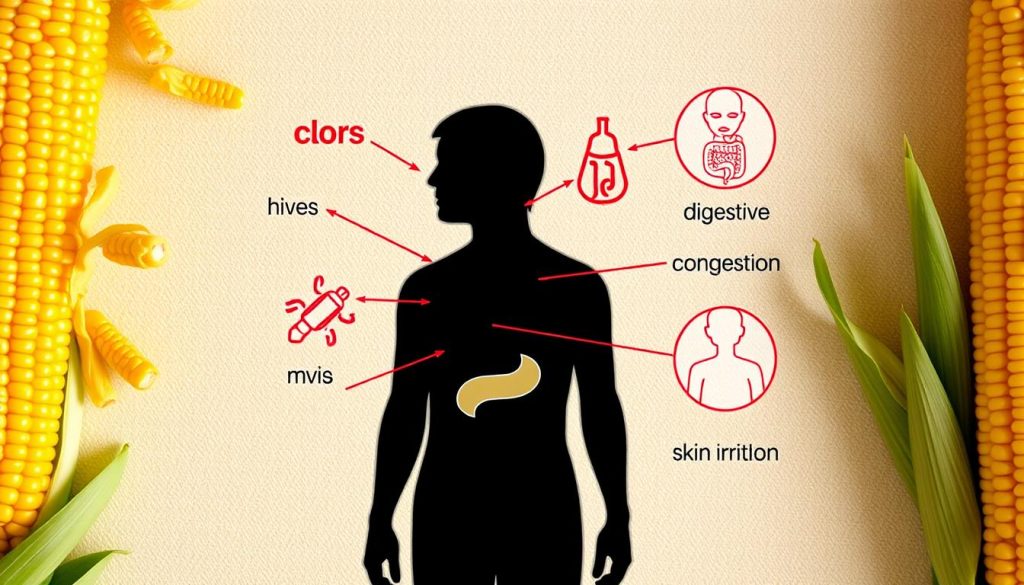
Common Corn Allergy Signs to be Aware of
Knowing how to spot corn allergy symptoms early is key to staying healthy. This knowledge can stop serious reactions, especially for those who are more at risk. Here are the main signs of allergic reaction to corn to help you catch them early and take steps to avoid them.
- Anaphylaxis: This is a severe reaction that can cause a fast heartbeat, low blood pressure, dizziness, or feeling lightheaded. It’s very important to get medical help right away.
- Skin reactions: You might see hives, itching, or eczema that happens after eating corn.
- Respiratory issues: Signs include tight airways, wheezing, and trouble breathing. These are serious symptoms of an allergic reaction.
- GI disturbances: You might feel stomach pain, throw up, or have diarrhea soon after eating corn or products with corn in them.
Recognizing corn allergy means watching for these signs when you eat corn or products with corn. Spotting them early can help avoid serious problems.
| Signs | Immediate Symptoms | Response Time |
|---|---|---|
| Anaphylaxis | Yes | Minutes |
| Skin Reactions | Hives, Itching, Eczema | Minutes to Hours |
| Respiratory Issues | Difficulty breathing, Wheezing | Minutes to Hours |
| GI Disturbances | Abdominal Pain, Vomiting, Diarrhea | Hours to 1 Day |
Differentiating Between Corn Allergy and Corn Intolerance
It’s important to know the difference between a corn allergy and corn intolerance. This is especially true when looking at symptoms and how to manage them. A corn allergy diagnosis shows that the main difference is how the body reacts. We’ll look at how these two conditions affect the body in different ways.
Defining Corn Allergy
A corn allergy is a serious immune system reaction. The body sees corn or corn products as harmful and makes antibodies. This can cause symptoms like anaphylaxis, which is very dangerous and needs quick medical help.
Getting a proper diagnosis for a corn allergy is crucial. It helps manage the condition safely.
Recognizing Corn Intolerance Symptoms
Corn intolerance causes digestive problems like bloating, gas, and diarrhea. It doesn’t involve the immune system. These symptoms usually show up slowly and are not as severe. This makes it easier to keep track of and manage them.
But, it can be hard to tell if these symptoms are from intolerance or a mild allergy. Knowing the difference between corn intolerance versus corn allergy is helpful.
We provide detailed help to understand symptoms and manage these conditions. This way, people can stay healthy while following their dietary needs.

Potential Triggers: Hidden Sources of Corn
Finding out what triggers a corn allergy means looking at both common and hidden sources of corn. It’s key for those allergic to corn to avoid accidental exposure.
Processed Foods and Corn Derivatives
Processed foods often hide corn-based ingredients that can cause allergic reactions. From thickeners to sweeteners, corn is everywhere in what we eat. Being careful is very important.
| Common Product | Hidden Corn Derivative |
|---|---|
| Soft Drinks and Juices | High-Fructose Corn Syrup |
| Condiments | Dextrose, Maltodextrin |
| Baked Goods | Cornstarch |
| Deli Meats | Corn-Based Fillers |
Even everyday grocery items can hide corn, tricking those trying to stay away from it.
Non-Food Items Containing Corn
Corn isn’t just in food; it’s also in non-food products. Knowing where corn hides is vital for living without it.
- Toiletries like toothpaste and body lotions use corn derivatives.
- Adhesives in envelopes and stickers contain dextrin, a corn product.
- Biodegradable plastics and fabrics might be made from corn.
Being aware of corn in both food and non-food items helps those allergic to corn avoid its problems.
Corn Allergy Symptoms in Children
It’s important to know the corn allergy signs in children to manage it well. Corn is in many foods kids eat, and it can cause allergic reactions. We will look at the symptoms and how to manage pediatric corn allergy effectively.

Corn allergy symptoms can be tricky to spot. They include skin rashes, stomach problems, and breathing issues. These can happen right away or hours later after eating corn.
It’s key to watch for any unusual reactions after eating, especially in foods and sweets with hidden corn.
- Skin reactions: Redness, hives, or eczema are common and can be particularly distressing for young children.
- Digestive issues: Symptoms like stomach pain, vomiting, and diarrhea are frequent indicators of a corn allergy.
- Respiratory symptoms: From simple sneezing to severe asthma attacks, respiratory reactions are urgent signs requiring immediate attention.
Understanding managing pediatric corn allergy means knowing where corn is in a child’s diet. Parents and caregivers need to read labels carefully. They should avoid foods and products with corn.
It’s also important to teach caregivers and teachers about the allergy. They need to know how to keep the child safe from allergens.
Getting help from a pediatric allergist is a good idea. They can give advice and treatment plans. This might include antihistamines or other treatments based on the allergy’s severity.
Managing a child’s corn allergy well means being educated and careful. With the right steps, kids with corn allergies can live healthy, worry-free lives.
When to Suspect an Allergic Reaction to Corn
Figuring out if you have a corn allergy can be tricky. This is because the symptoms can vary a lot. It’s important to know the signs of both immediate corn allergy reaction and delayed corn allergy symptoms. This knowledge helps you act fast and manage the allergy better.
Immediate Symptoms of Corn Allergy
It’s key to spot immediate reactions quickly. They can get worse fast and need quick help. Signs like swelling in the throat, trouble breathing, and bad hives mean you’re having an immediate corn allergy reaction. These happen right after eating corn and can be very serious.
Delayed Reactions and Corn Sensitivity Signs
Delayed symptoms show up hours or days after eating corn. They can include stomach problems, skin issues like eczema, and feeling very tired. Spotting these can be hard because they’re not as obvious and take time to show up.
| Immediate Reaction | Delayed Reaction |
|---|---|
| Anaphylaxis | Eczema |
| Throat Swelling | Digestive Distress |
| Difficulty Breathing | Chronic Fatigue |
If you think you might have a corn allergy, watch for both kinds of reactions. Seeing an allergist is a good idea to get tested and find out for sure. Knowing how corn affects you can help you avoid serious allergic problems.
Diagnosing Corn Allergy: Methods and Challenges
Finding out if you have a corn allergy takes a careful plan. It mixes doctor’s tests and your own watch. You need both corn allergy testing and self-monitoring for corn allergy to get it right.
Corn Allergy Testing
Doctors use different tools to spot corn allergies. But, finding out can be hard because corn is everywhere. They might do skin tests or blood tests to see how your body reacts to corn.
Self Monitoring and Diagnosis
If you think you might be allergic to corn, keep an eye on what you eat. Write down what you eat and how you feel. This can help you find out what might be causing your symptoms before you see a doctor.
Knowing about both the science and your own body can help you deal with health issues better.
| Diagnostic Method | Description | User Responsibility |
|---|---|---|
| Skin-Prick Tests | Small amount of corn allergen placed on skin to check for reaction | Report extent and type of skin response |
| Specific IgE Blood Test | Measures IgE antibodies in blood after exposure to corn proteins | Monitor and report any adverse reactions post-testing |
| Dietary Log | Self-recorded food diary to track intake and symptoms | Maintain accurate, detailed food records |
| Elimination Diet | Removing corn and derivatives from diet to gauge symptom change | Strict adherence and symptom documentation during period of diet |

Medical Management and Corn Allergy Treatment
Managing corn allergies involves a detailed plan. This includes medication, changing your diet, and making lifestyle changes. Medical treatment for corn allergy starts with a plan made just for you. It’s based on how severe your allergic reactions are.
Antihistamines are often given to quickly treat allergic reactions. For severe cases like anaphylaxis, epinephrine autoinjectors are crucial. They should always be with you. Managing corn allergies means avoiding foods with corn. This requires knowing how to read food labels well.
- Education on reading labels: Finding hidden corn like dextrose, maltodextrin, and xanthan gum;
- Establish allergen-free environments: Making sure schools and workplaces are safe;
- Emergency preparedness: Learning how to use epinephrine and recognizing severe allergic reactions.
Long-term managing corn allergies means regular visits to allergy specialists. They keep you updated on new treatments. Dietitians also join your care team. They help make sure your diet is balanced and corn-free.
“The key to successful management of corn allergies lies in a proactive approach, educating patients and caregivers, and continuously adapting to their evolving health needs.”
Navigating Diet: Coping with Corn Allergy
For those with a corn allergy, managing their diet is key. It helps avoid allergens and keeps them healthy. This guide offers tips on finding safe corn substitutes and reading labels.
Safe Alternatives to Corn Products
Corn allergy dietary management means finding tasty, healthy corn substitutes. Here are some alternatives to corn:
- Rice-based products are great for meals, replacing corn.
- Quinoa is nutritious and flavorful, perfect for many dishes.
- Barley and oats are excellent for baking and cooking.
Also, new foods like cassava flour and chickpea pasta are popular. They’re versatile and don’t contain corn, making them good alternatives to corn.
Reading Labels for Corn Ingredients
Learning to read labels for corn ingredients is vital for managing a corn allergy. Corn can hide under different names that might not be obvious.
| Common Corn Ingredient | Alternate Names |
|---|---|
| Corn syrup | Glucose syrup, Maize syrup |
| Corn starch | Modified starch, Food starch |
| Dextrose | Glucose |
| Xanthan gum | Food additive |
Knowing these names is key to reading labels for corn ingredients. For more on managing your allergy, check out this detailed resource on corn allergy.

With the right choices and planning, living with a corn allergy can be safe and fulfilling. Adopting these strategies can greatly enhance your life quality.
Corn Allergy Rash: Identifying and Treating Skin Symptoms
Identifying corn allergy rash and treating corn allergy skin symptoms is key for those allergic to corn. A corn allergy can cause different skin reactions. If not treated right, it can really impact your life.
The rash from a corn allergy looks like red, itchy bumps. It’s important to tell it apart from other skin issues. These could be caused by other allergens or irritants.
- Watch the rash’s size, shape, and how long it lasts
- Notice if there’s swelling or itching
- Think about any recent corn products you’ve used
For treating corn allergy skin symptoms, you might need:
- Antihistamines for itching and swelling in mild cases
- Corticosteroid creams for more serious skin issues
- Moisturizing regularly to heal and prevent irritation
It’s also important to avoid corn products and things that might have corn in them. Always check the labels of what you buy.
If you think you have a corn allergy, see an allergist or dermatologist. They can do tests and give you a plan to manage your allergy.
Dealing with a corn allergy well helps you feel better physically. It also makes you feel more secure in your daily life. You can safely enjoy your food and surroundings.
Long-Term Health Considerations with Corn Allergy
Dealing with a corn allergy is more than just avoiding certain foods. It affects a person’s health and happiness over time. Those with this allergy face many challenges that go beyond just allergic reactions.
The long-term effects of corn allergy include missing out on important nutrients. This is because corn is in many foods we eat. It’s key to get help from doctors to eat right and get all the nutrients needed.
Proper management can mitigate the long-term risks associated with a corn allergy, enhancing a patient’s quality of life.
Also, the mental side of living with a corn allergy is very important. Always watching out for corn can cause stress and anxiety. These feelings are big health concerns too.
| Nutrient | Common Sources | Alternatives |
|---|---|---|
| Fiber | Corn-based cereals, breads | Whole grains, fruits, vegetables |
| Protein | Corn-fed meat, tofu | Grass-fed meats, legumes, quinoa |
| B vitamins | Cornmeal, cornbread | Leafy greens, nuts, eggs |
People with a corn allergy must plan their diets carefully. They need to find foods that are as nutritious as corn but different. With the right advice, managing a corn allergy can be easier.
In the end, managing a corn allergy is complex. It involves watching what you eat, getting emotional support, and seeing doctors regularly. By tackling these areas, people can live better lives despite the corn allergy challenges.
Essential Tips for Avoiding Corn and Preventing Symptoms
Living with a corn allergy means being careful and proactive. You need to avoid corn and know how to handle emergencies. Here are key tips to help you live better, learn about corn allergy, and stay safe.
Educating Others about Your Corn Allergy
Telling people about your corn allergy is important. This includes family, friends, and workmates. Here’s how to teach them:
- Tell them which foods and products have corn and should be avoided.
- Explain what a reaction looks like, so they know when to act fast.
- Share ways they can help keep your environment corn-free.
- Ask them to check food labels and ask questions when eating out.
Emergency Preparedness for Severe Allergic Reactions
Being ready for emergencies is crucial for severe corn allergies. Here’s how to prepare:
- Always carry your prescribed medicine, like an epinephrine auto-injector, with you.
- Wear a medical alert bracelet that shows your allergy.
- Have a plan ready that explains what to do in case of a reaction.
- Make sure your close friends and family know how to use an epinephrine auto-injector and recognize anaphylaxis.
By educating others and being prepared for emergencies, you can lower the risk of serious reactions. This makes you safer and more confident.
Promising Research and Future of Corn Allergy Treatment
As corn allergy research moves forward, new treatment options are emerging. This brings hope to those dealing with this chronic condition. Understanding how the immune system reacts to corn is key to finding new future treatments for corn allergy.
Researchers are working on targeted therapies to make the immune system less reactive to corn allergens. These breakthroughs could change how corn allergies are treated. They aim to bring relief and better lives to many.
- Exploration of hypoallergenic corn variants
- Advances in biologic medications specifically designed to block allergen pathways
- Development of oral immunotherapy protocols for gradual desensitization
With each research step, the hope for better treatments grows. The aim is to not just manage symptoms but to lessen the allergy’s daily impact.
| Research Focus | Potential Impact |
|---|---|
| Hypoallergenic Corn Variants | Reduce allergic reactions, making corn consumption safer |
| Biologic Medications | Target and neutralize specific allergy pathways |
| Oral Immunotherapy | Enable gradual tolerance building, reducing sensitivity |
This corn allergy research is vital. It not only deepens our understanding but also sets the stage for future treatments for corn allergy. These could greatly improve the outlook for those affected.
Conclusion
We’ve explored the key points about corn allergies. It’s important to know the symptoms and what can trigger them. Also, understanding the difference between an allergy and intolerance is crucial.
Managing a corn allergy means being careful with food labels. Knowing about corn in processed foods is also key. Having a plan for when you accidentally eat corn is important too.
Getting a professional diagnosis and following medical advice is vital. This helps keep those with corn allergies safe and healthy. While it’s hard to find all corn sources, new research offers hope for better treatments.
People with corn allergies are not alone. The medical community and support groups are there to help. They offer the care and guidance needed.
After being diagnosed with a corn allergy, knowing what to do is important. This guide aims to help you understand and manage corn allergies. It’s all about reducing risks and improving your life.
As we learn more about corn allergies, our goal is to help those affected. We want them to live full and healthy lives. Knowledge and support from others are key to achieving this goal.
FAQ
Q: What are common symptoms of a corn allergy?
A: Symptoms of a corn allergy can vary. They can be mild or severe. You might experience wheezing, shortness of breath, or stomach pain. Skin reactions like hives or rashes are also common.
Q: How common are corn allergies and who is most at risk?
A: Corn allergies are not as common as some other food allergies. But, they can affect anyone. Some people might be more at risk, like those with a family history of allergies.
Q: How can I tell if I have a corn allergy or corn intolerance?
A: A corn allergy is an immune reaction that can be serious. It can cause anaphylaxis. Corn intolerance, on the other hand, mainly affects digestion. A doctor can help figure out which you have.
Q: What should I do if I suspect I have a corn allergy?
A: If you think you have a corn allergy, see a doctor. They can do tests to confirm it. Keep a food diary to track your symptoms and what you eat.
Q: What are some hidden sources of corn I should be aware of?
A: Corn is in many foods you might not expect. It’s in processed foods, additives like dextrose, and even some cosmetics. Be careful with what you eat and use.
Q: How can I manage a corn allergy in children?
A: Managing a corn allergy in kids means watching what they eat. Teach others about the allergy. You might need to work with a dietitian to make sure they get the nutrients they need.
Q: Are there any treatments available for corn allergy?
A: To treat a corn allergy, avoid corn and products with corn. Use antihistamines for symptoms. In serious cases, carry an epinephrine auto-injector.
Q: What alternatives to corn products can I safely consume?
A: Safe alternatives include rice, quinoa, and barley. Always check labels. A dietitian can help find good substitutes for your diet.
Q: How can I identify and treat a corn allergy rash?
A: A corn allergy rash looks like red, itchy welts. Use creams, antihistamines, and avoid corn. See a doctor for severe or lasting reactions.
Q: How should I prepare for emergency situations if I have a severe corn allergy?
A: Carry an epinephrine auto-injector and wear medical alert jewelry. Make an allergy action plan. Tell friends and family how to help in an emergency.
Q: What research is being done on corn allergy treatments?
A: Researchers are looking into new treatments. This includes immunotherapies and ways to desensitize. Studies are key to finding better ways to manage corn allergies.












